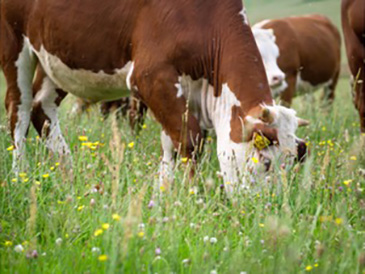The Science and Art of Organic Farming and Food
Organic. We see the word everywhere in the food and farming world, but what exactly does it mean? Few are entirely sure, and without a full understanding of the word and the agricultural practices involved, it is impossible to truly ponder the many ideas casually thrown around about organic food and farming- particularly regarding links between human health and organic diets- to form an individual, unbiased understanding and opinion on organic agriculture.
Organic Farming
What legally qualifies as organic varies from government to government, which does not help in the confusion around organic food and farming. At present, the UK abides by EU regulations, however how our government regulates and defines organic is liable to change next year in the advent of Brexit. Despite the fact that regulations around organic farming vary between nations and are subject to change, there is a general consensus on the key points defining the difference between organic and conventional agriculture. Essentially, organic farming aims to respect natural cycles and ecologies, and promote high biodiversity on farms, whilst still being able to produce high-quality and sufficient yields of plant and animal products. Organic farmers do this by limiting the use of synthetic fertilisers and pesticides, in favour of increased usage of manures, crop rotations, and natural pest control (for example, by maintaining populations of natural enemies-eg predators and grazers- of pests and weeds to control pest populations). Farm animals are not given antibiotics/growth hormones/steroids/or unnatural diets, and are instead kept healthy and encouraged to grow and thrive through diets of organic feeds and high-quality, species-specific animal husbandry practices. Organic farm animals also must be free range, meaning that they’re allowed to roam free outside for at least some of the day, each day.
Organic Food
A key factor defining organic food is that it must be completely free of genetically modified organisms (GMOs). Genetic modification is the laboratory process in which humans integrate genetic material of a different species into a target organism, to introduce a desired trait into the target (for example, the integration of genes that produce insecticidal toxins into crops, enabling the crop to poison certain pests and thus decreasing the need for externally sprayed pesticides). Genetic modification is strictly prohibited in the world of organic food and farming, so all desired product traits must be achieved through traditional breeding techniques and careful, species-specific agricultural techniques. ‘Health benefits’ to eating organic are often cited, however there is no consensus in the scientific literature at present to support or deny these claims. Despite the lack of agreement on direct links between organic food and human health, it cannot be disputed that organic products contain far lower levels of synthetic residues on them (fertilisers, pesticides and herbicides, etc.). Linking the presence of these residues to health is an active area of research; but even without the scientific research, it is probably safe to say that most people feel more comfortable eating cleaner food without synthetic-chemicals (largely with unknown, but likely to be detrimental, effects on human health) on them. Furthermore, multiple published studies have shown that organic food indeed contains higher concentrations of certain nutrients compared to conventionally grown food. For example, in a study published in 2001 by the Journal of Alternative and Complementary Medicine, V. Worthing found that there are higher levels of vitamin C in organically grown fruits, vegetables, and grains. Also in 2001, H. Ren et al. confirmed that higher levels of antioxidant activity are found in organically grown green vegetables. Even animal products seem to have higher nutrient content when grown organically: organically farming dairy cows positively impacts the beneficial fatty acid composition of their milk! Although linking these nutritional content changes to human health effects has proven difficult, it is not sensible to throw these findings away and deem them irrelevant.
Conclusion
The science behind organic food and farming is an active field of research in multiple scientific fields. Real world effects and practical applications of the scientists’ findings are finally being uncovered, which will undoubtedly continue to be used to refine organic practices and governmental regulations on organic food and farming, and to fully understand costs and benefits of organic food and farming on the environment, yields, human health, and animal welfare.



Comments